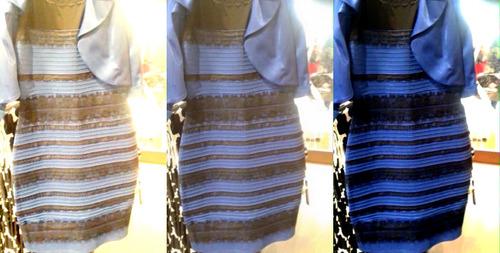The Great Dress debate of '15
One of the curious properties of the internet hivemind is its rapid turns of sheer obsessiveness and utter oblivion. Case in point; Ferguson, Missouri.
The internet outrage over events in Ferguson burned hot and fast in November of 2014, but was more or less forgotten by Christmas. While in fact, at the time of this writing, local people are still protesting police brutality and being illegally, unjustly incarcerated for doing so. Their photographic evidence is also being destroyed and tampered with.
For the last few days, the internet's great obsession has been the much more light-hearted debate over the color of this dress:

The internet is currently flooded with theories on why people see the dress in various ways.
We know for a fact that the original dress is black on blue. But the manufacturer plans on producing a gold on white version as well. How wonderful.
The switch is happening on multiple levels: The image is altered as the filetype is converted and copied across the web, creating countless different versions of the image. Different screens display it differently. It can change depending on the angle of the screen. Some people blame poor photography (everyone has a camera phone these days. The cookies are definitely on the bottom shelf for what defines "good" photography)
But the fact is: It is possible for two healthy people, both with otherwise "normal" vision to look at the same object and see something Fundamentally Different.
Think about that.
This is a trivial matter. A dress. One of billions of other dresses a person could wear. But if we can get something as basic as this so wrong, what else are we missing? The potential is vast, and disconcerting.
I think I will make a game now of asking people very basic questions about their sensual perceptions. My theory is that our senses are not as objective, or as trustworthy as we often believe.
The part where I tie the above assertion into Gaming:
A GM is responsible for describing not necessarily the world the PCs are in. But rather, the PCs perceptions and sensations of that world.
I do not like to let players roll their own perception checks. Or any other time when the result of the check would not be immediately apparent. I prefer to ask their modifiers and roll for them, and relate what they did notice, if anything at all. This is done for the same reason I only draw as much of the dungeon map as they can see in the radius of their lights; to cleanly separate Player knowledge from Character knowledge.
If the player sees that he rolled a 19 on the check before adding his modifiers (assume d20 system), He will have a good deal of confidence in the perception I relate to him and act accordingly.
On the other hand, if the roll is hidden, he may or may not feel that he can trust his perception. He may well wish that we were rolling with a bell-curve check rather than with that capricious d20.
Does this slow down the game by increasing paranoia? Possibly.
Gygax and Arneson decide to make "traps" an integral part of the genre and now it's our cross to bear. Way to go, you assholes.
But fear not my players. This ain't the Tomb of Horrors and I ain't Acererak the Demi-Lich.
Don't get the reference? Google it.
You see, I want for you to succeed. If I make a secret roll, chances are 50/50 that I am checking whether you didn't notice what you typically should have. I'm not checking for success. I might expect that. I'm just checking for failure.
Because believe me, nothing derails an adventure like when the whole party fails to notice that one thing they were supposed to because of bad rolls. Or you were playing a B/X clone (I'm looking at you, Lamentations of the Flame Princess)
So yeah. keep your rolls secret when it makes sense, but let you players know that the idea is not to screw them over. And never leave to a die roll what you should be leaving to your own discretion.
TL;DR
The internet debate over the blue/black white/gold dress is notable because it demonstrates the subjectivity and fallibility of our perceptions.
In game, Player Characters also have unreliable senses. As DM, I like to roll perception checks for the characters, and make my description to the player based upon that result. This prevents Players from making decisions based on out of character knowledge of how well they rolled.
